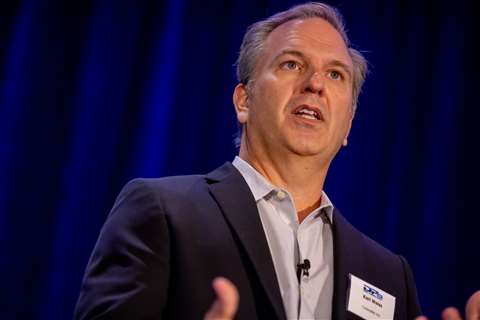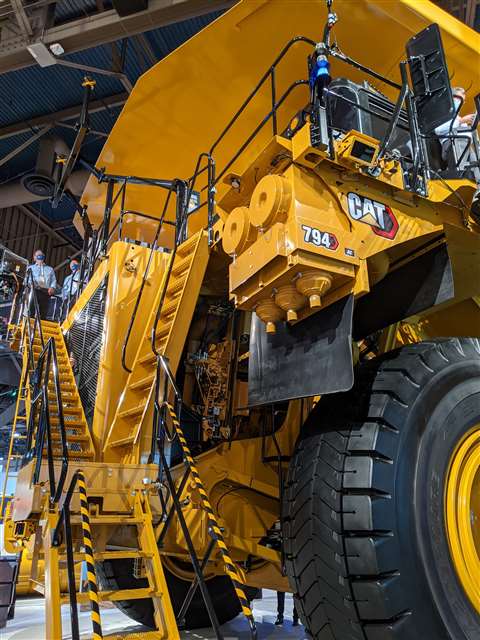Caterpillar’s Karl Weiss sees different sustainable paths for different customers
29 September 2022
Speaking at the 2022 Diesel Progress Summit, Weiss said customers “describe the finish line” when it comes to success on the path to sustainability
 Karl Weiss, senior vice president and chief technical officer, Caterpillar Inc., speaking at the fourth annual Diesel Progress Summit in Rosemont, Ill. (Photo: KHL/Joe Mather)
Karl Weiss, senior vice president and chief technical officer, Caterpillar Inc., speaking at the fourth annual Diesel Progress Summit in Rosemont, Ill. (Photo: KHL/Joe Mather)
There are very challenging “opportunities” ahead for OEMs and their suppliers, said Karl Weiss, senior vice president and chief technical officer, Caterpillar Inc., in his keynote speech at the fourth annual Diesel Progress Summit in Rosemont, Ill., all of which are driven by sustainability. While regulation plays its part, customers are ultimately the ones driving the demand for more sustainable power system solutions.
“Regionally, countries, governments, regulatory bodies will create the rules that set our path in the future. But our customers really describe the finish line,” Weiss said. “What’s the goal? The goal is to help them succeed.”
To ensure they do calls for a multi-pronged approach. “There isn’t going to be one path to an ultimate solution. There are several paths and, depending on where you compete, who your customers are, what the local regulations are and the local infrastructure, you’re going to need to be able to serve different solutions to different customers,” Weiss said.
This includes delivering an increasingly lower carbon footprint in established power sources to meet the needs of customers in remote areas or regions without access to the power grid. “We need to be able to serve their needs for many, many years to come and provide them with greener, sustainable solutions that allow them to be at work in remote areas and be successful,” said Weiss.
Technology combination
For other customers, more advanced solutions may be needed. “We’ve been working on alternatives to provide both diesel-electric and fully electric power for systems that best suit those customer applications. We also have worked… on solutions like microgrids that are able to use wind, solar as well as backup diesel energy to provide customers with greener, more sustainable solutions in remote locations,” Weiss said.
 The Caterpillar 794 AC mining truck. (Photo: Chad Elmore)
The Caterpillar 794 AC mining truck. (Photo: Chad Elmore)
In addition, Caterpillar is working toward zero-emission solutions in the form of batteries and fuel cells. “Providing customers safe and very reliable means of getting that power to do the work that they need is critical,” said Weiss. “But it’s more than just electrification and/or powertrains. It’s bringing our full business model to bear as we solve our customers’ greatest problems.”
For Caterpillar, this means combining autonomy, electrification, digital and connectivity to provide even more sustainable and productive products. Weiss used an electric mining truck as an example.
“Think about what happens if you send a truck down into a mine and there’s not enough power to get that truck back out. So, it’s stuck on the side of a mine where no one can pass it,” he said. “You really need to be able to give that driver the intelligence to know… when do you need more power?”
While such intelligence is available with diesel fuel, it’s more complicated when electric vehicles are involved. “Because if you have 150 trucks on a mine site – 150 MW of energy needed – are you going to charge all of them at lunchtime? Is there enough infrastructure, enough power on that mine site to charge those trucks all at once? Not at all – or it would be very, very expensive to do,” Weiss said. “So, we’re going to have to dynamically charge those trucks, we’re going to have to automate the process of leveling the load for that mine site to be able to sustainably drive 150 MW mining trucks 24 hours a day.
“So, it’s not just about the power plant. It’s about connecting all of it together and automating as much of it as possible to help our customers go to their next steps in their goals and solutions.”
Working toward a common goal
As Weiss noted, the customer ultimately establishes the sustainability objectives. Thus, the goal of suppliers is to help their customers meet those objectives. But in order to be successful in this task, you must understand both your strengths and the problems your customers are asking you to solve.
“That path to success is going to be different for each of us,” Weiss said. “We can get enamored with the latest headlines and want to chase that next great, shiny object. But focusing our engineers and our teams on the solutions that really will help our customers is key.
“In the end, we all have very similar goals in getting the most effective power to do the work and in the cleanest way possible. And that’s a [different] journey for each customer. We’ve got to be able to solve those problems by providing platforms that can serve those different options.”
Coming together as a community to educate customers on the different paths they can take, as well as educating the public and regulatory bodies about the infrastructure demands going forward, can help in solving those problems longer term, said Weiss.
“Lithium demand over the next few years is going to go up 20 times. The grid network that’s going to be needed around the world will have to be more robust and more extensive than it’s ever been,” he said. “So, developing that infrastructure and helping solve those problems is a key part of where we’re headed.”
The infrastructure that will be needed to support electric or hydrogen distribution will take many years and substantial investment. “And so again, educating those bodies that make the decisions and the regulations and the investments to understand what is needed,” said Wiess, “will be beneficial to the [entire] industry.”
STAY CONNECTED




Receive the information you need when you need it through our world-leading magazines, newsletters and daily briefings.
POWER SOURCING GUIDE
The trusted reference and buyer’s guide for 83 years
The original “desktop search engine,” guiding nearly 10,000 users in more than 90 countries it is the primary reference for specifications and details on all the components that go into engine systems.
Visit Now
CONNECT WITH THE TEAM










